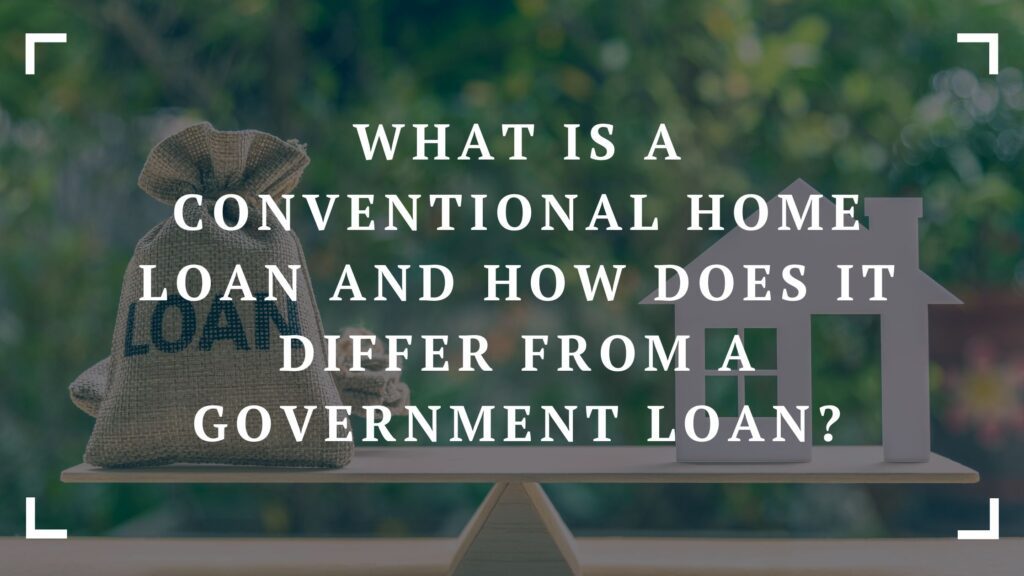For many people, purchasing a home is one of the largest and most important financial decisions they will make in their lifetime. If you’re in the process of buying a home, you may be wondering about the different types of loans available to help finance your purchase. Two common types of home loans are conventional loans and government loans. Here is a breakdown of what each loan type means and how they differ from one another.

What is a Conventional Loan?
A conventional loan is a mortgage loan that is not guaranteed or insured by any government agency, such as the Federal Housing Administration (FHA), the United States Department of Agriculture (USDA), or the Department of Veterans Affairs (VA). These loans are typically offered by private lenders, and the qualification requirements are often stricter. Borrowers are typically required to have a higher credit score and a larger down payment than with government loans.
What is a Government Loan?
On the other hand, government loans are mortgage loans that are guaranteed or insured by a government agency. There are three main types of government loans: FHA loans, USDA loans, and VA loans.
FHA loans are issued by the Federal Housing Administration and are ideal for borrowers with moderate credit scores or those who cannot make a large down payment. USDA loans are designed for low-to-moderate income borrowers in rural areas who meet certain eligibility requirements, and VA loans are available to eligible veterans and active-duty military members and offer benefits such as no down payment or mortgage insurance requirements.
Key Differences Between Conventional Loans and Government Loans
The main difference between conventional loans and government loans is that the latter are backed by a government agency, while the former is not. Government loans tend to have more relaxed qualification requirements, making them ideal for borrowers with lower credit scores or smaller down payments.
Conventional loans, on the other hand, may have stricter qualification criteria and require a higher credit score and larger down payment. It is essential to understand the differences between conventional loans and government loans, especially when buying a home. When considering home loans, it is important to consider whether a conventional or government loan will best suit your needs.
Understanding the Pros and Cons of Each Loan Type
When considering a conventional or government loan, it is important to understand the pros and cons of each. Conventional loans often offer more flexibility in terms of loan amount and repayment terms, while government loans may offer benefits such as lower interest rates, no down payment, and more relaxed qualification requirements. However, government loans may come with certain restrictions and limitations, such as property location requirements or eligibility criteria based on military service.
Also, government loans may involve more paperwork and application requirements compared to conventional loans. Private lenders like District Lending can help you navigate the various loan options and choose the one that works best for your unique financial situation. Whether you opt for a conventional or government loan, it is important to understand the pros and cons of each.
Choosing the Right Loan for You
Choosing the right loan for you depends on various factors specific to your situation, such as income level, credit score, down payment amount, and property location. It is important to work with a trusted lender who can help you compare conventional and government loan options and determine which one best meets your financial needs.
Additionally, make sure to consider the long-term financial impact of each loan. This involves reviewing the interest rates, repayment terms, and overall cost of the loan over time. Careful consideration of these factors will help you make an informed decision about which loan type is right for you.
Conclusion
When deciding between conventional and government loans, it is important to understand the advantages and disadvantages of each type. Working with a reputable lender and carefully reviewing the loan options will help ensure that you make an informed decision based on your specific financial situation.
When considering whether to choose a conventional or government loan, it is important to weigh the pros and cons of each, including factors such as qualification requirements, interest rates, repayment terms, and overall costs. Ultimately, choosing the right loan for you requires careful consideration of your unique financial situation and long-term goals. Your lender can be a valuable resource in helping you compare loan options and determine which one is the best fit for your needs.


